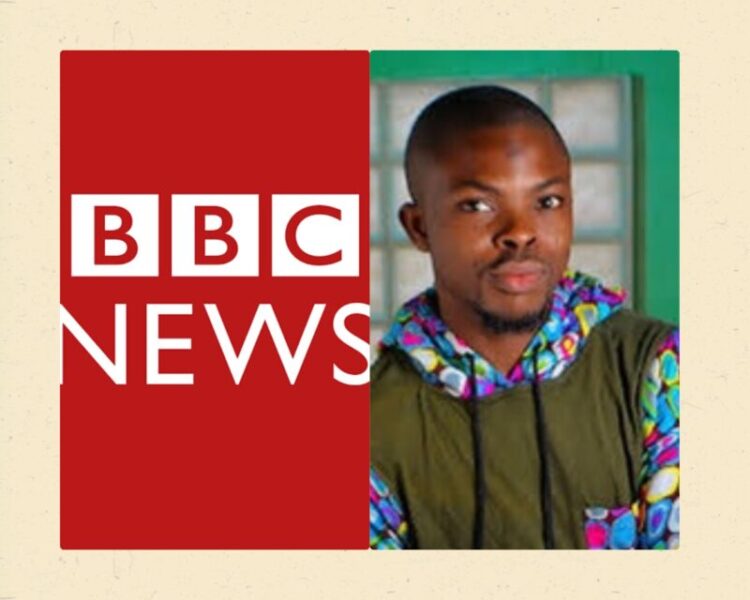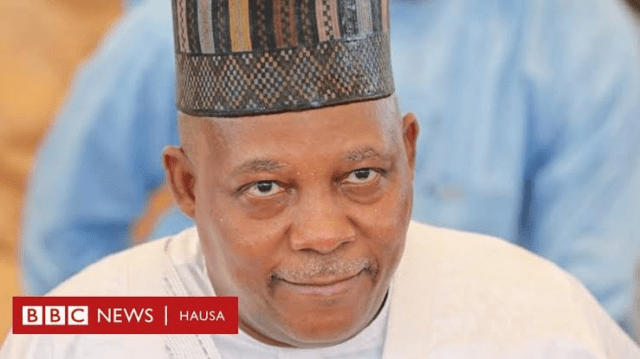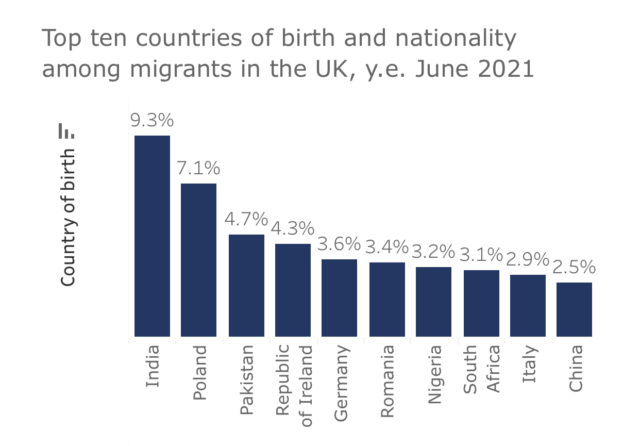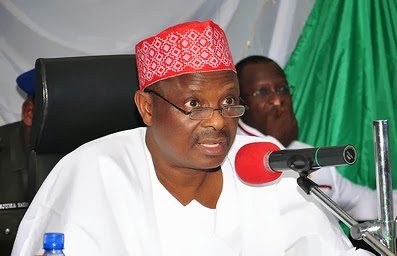National Issues
Emdee Tiamiyu: Inside The BBC’s War Against Nigeria -By Khaleb Ogbonna
While it is important not to sound excessively patriotic, it is undeniable that Nigeria faces its fair share of issues, particularly in leadership, which has contributed to a significant migration trend towards European and North American countries, such as the US, UK, and Canada. However, it is crucial to acknowledge the positive contributions Nigerians have made to the development of these nations.

“It is 7:30 am in Kongolam, a border town between Nigeria, the most populous country in Africa, and West Africa’s largest nation by landmass. The weather here is freezing(…).”
Oh no!
Don’t tell me you were expecting another article in the style of the BBC, focusing solely on negative stories about Nigeria. It often seems like there is a consistent effort to produce quarterly reports that cater to the de-marketization strategy favoured by the British Broadcasting Corporation (BBC), with fame-driven journalists eager to exploit Nigeria’s challenges for their professional gain.
In a recent video that has stirred controversy among Nigerians, Nigerian UK-based YouTuber, Emdee Tiamiyu, accused his fellow citizens of exploiting the UK immigration system by using the student visa route to seek better opportunities abroad, even when they have no genuine intention to study in the UK. Tiamiyu shared his perspective during an interview with the BBC.
According to Tiamiyu, “The student route is more like an answered prayer. It is a big opportunity that can accommodate many ordinary people.” He also claimed, “We’re beginning to see that a lot of people just hide behind the studentship. So the student thing is not real; it’s not like they need the degrees.”
While it may be tempting to dismiss Mr Tiamiyu’s statements due to his apparent lack of self-esteem and uncoordinated communication style, it is important to step back and examine the broader context. Beyond the sensationalism that the BBC tends to employ, there is a question worth exploring: Why does the BBC predominantly highlight the worst aspects of Nigeria, showcasing the darker side and ignoring the numerous positive developments emerging from the country daily?
In the grand scheme of things, Tiamiyu can be seen as a minor player caught in the midst of a larger agenda. With the benefit of doubt in mind, I entered a Twitter space hosted by Tiamiyu after his controversial remarks. To my disappointment, it wasn’t the angry individuals berating him that bothered me the most; rather, it was the missed opportunity for many to recognize the covert operation being carried out by the BBC. Despite the extensive preparation for the show, Tiamiyu’s display of intellectual vacuity was a clear example of the BBC’s regular portrayal of Nigerians in a negative light. It angered me to witness the BBC once again selecting the worst representatives of Nigeria.
More recently, during the inauguration of the Dangote refinery, Senator Kashim Shettima, the vice president-elect, criticised the foreign media’s coverage of Nigeria, stating, “Africa is not solely defined by the crises in Sudan, poverty, deprivation, and insecurity. I hope news outlets like CNN, BBC, and Sky News will provide extensive coverage of this event.”

While some may criticise Shettima for his lack of grace in public commentary and exaggerated sense of patriotism, many of us who rely on positive images of Nigeria for our daily businesses resonate with his frustration, just like the BBC in a recent report, once again aimed a dig a on the outgoing president, Muhammadu Buhari, where it said his tenure highlighted issues of kidnapping, inflation, and debt, leaving a negative legacy.
Journalist Ms. Kadaria Ahmed also expressed her discontent with the BBC’s coverage of conflicts in Northern Nigeria in an article published in Nigeria’s respected newspaper, The Guardian. Ms. Ahmed argued that under the pretext of public interest, this is the argument that ‘BBC Africa Eye’ seems to be presenting, to justify its decision to actively give copious screen time to self-confessed murderers and kidnappers, who are still actively involved in attacking communities, killing, kidnapping, pillaging, and remotely making life brutish and a living hell for the people of Nigeria’s Northwest States, particularly, Zamfara.
It is concerning to see the BBC’s continuous focus on the problems in Nigeria as if there exists a perfect country without any challenges. What is troubling is that the BBC tends to overlook allegations of misconduct within its own organisation, as highlighted by investigative journalist David Hundeyin, who reported cases of journalistic malpractice and exploitation of junior staff by senior officials.
While it is important not to sound excessively patriotic, it is undeniable that Nigeria faces its fair share of issues, particularly in leadership, which has contributed to a significant migration trend towards European and North American countries, such as the US, UK, and Canada. However, it is crucial to acknowledge the positive contributions Nigerians have made to the development of these nations.
In its usual fashion, the BBC has given extensive coverage to the Tiamiyu interview, diverting attention away from other less sensational interviews like the one conducted by GB News. During that interview, Dr Emeka Okorocha highlighted the impact of migration on the UK economy. Dr Okorocha, a beneficiary of the dependent relative perk through his father’s migration as a healthcare worker with the NHS, emphasized the valuable contributions skilled workers make to the UK’s healthcare sector and the economic benefits derived from international student fees.
What media organisations like the BBC fail to emphasise is the substantial benefit that young Nigerians bring to the countries they seek refuge in. They neglect to mention that, according to a 2022 report by SBM Intelligence, the UK government itself stated that “international students are worth £29 billion to the UK economy,” falling short of their annual target of 600,000 international students with a current achievement of 486,868.
The report further highlights that the expected growth was projected to come primarily from countries like China, India, Nigeria, and Pakistan, with the aim of reaching £35 billion in education export figures by 2030. With eight years remaining to meet the projected target, the current £29 billion falls just £6 billion short.
Therefore, despite the BBC’s attempt to portray the United Kingdom as a refuge for Nigerians, providing more than just temporary relief for their struggles, the repercussions of mass migration from Nigeria result in a loss of human capital and a significant outflow of funds that would have otherwise contributed to the Nigerian economy. This impact is especially felt now as the United Kingdom grapples with the consequences of an emotionally driven political crisis — Brexit.
According to a publication titled ‘Migrants in the UK: An Overview’ by The Migration Observatory at the University of Oxford, India became the most common country of origin for migrants in the UK after a number of Poles left the UK. In the year ending June 2021, India, Poland and Pakistan were the top three countries of birth for the foreign-born, accounting respectively for 9%, 7% and 5% of the total. Poland dropped from the first place in 2018, during a period when net migration of people from countries that joined the EU in 2004 was estimated to be negative.

Despite having accurate data backing the population of persons in the UK, seeing that Nigerians do not even measure in population strength as compared to other countries, The BBC still persists in its campaign against Nigeria, given that it is funded by British taxpayers and possesses the resources to shape the narrative as it sees fit, employing willing puppets like the verbally incontinent Emdee Tiamiyu. Although his videos on YouTube failed to secure him the fame he desired, his brief appearance on the BBC granted him the notoriety that his fellow Nigerians will never forget.
In their characteristic style, the BBC’s stories and exposés may not always present a bleak picture for Nigerians. Nigerians will persevere and find ways to survive. However, one cannot help but question what happened to the days when we enjoyed engaging programs and captivating radio dramas, all sponsored by the BBC. They have since lost track of ‘helping’ us develop despite investing in our various indigenous languages (BBC Hausa, Igbo and Yoruba) but are more interested in clickbait journalism.
In this ongoing struggle, there are no casualties, only stories to be recounted about how we continually strive to endure.
Khaleb Ogbonna is a media executive and wrote this article from khalebpowers@gmail.com.




















